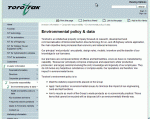WARNING: sticklebacks can cause choking, vomiting and severe stomach pains if swallowed. So would read the food safety report on these small fish for their larger predators.
They have a spiny dorsal fin which they can raise if another fish attempts to eat them, hence the name. Its purpose is to lodge the stickleback, somewhat painfully, in the mouth or throat of its predator.
Often as not, this causes the predator in question to spit the stickleback out, thus saving its life.
Smaller listed companies can be compared quite favourably to sticklebacks. Preyed upon by larger fish, they often have to develop self defence mechanisms which can be surprising in their elegant simplicity.
On a whim, I thought I’d have a look at those FTSE Fledgling companies, equity vehicles aside, who were due to publish their reports last week. Perhaps their websites would have signs of sustainable spines, ready to be raised as a predator approaches?
Um….. No. Not Yet.
The answer is a big, round No. One of the companies doesn’t appear to have updated its website for two and a half years and two others have slipped the date of their report publication by a couple of weeks.
A fourth has no direct mention of sustainability issues on its website and its hot-off-the-press report contains only the dry statement: “The Board expects the Audit Committee members to have an understanding of … environmental and social responsibility best practices.”
This left three companies from the original list: Caffyn’s, a luxury car dealership; S & U, a niche finance provider; and Torotrak, who specialise in vehicle transmission systems.
All three of these recognise sustainability issues within their reports, demonstrating that they acknowledge their responsibility towards both the environment and their employees.
Of these only Torotrak has a sustainability section on its website, whose brief contents are taken directly from the report.
Quite why this is is hard to fathom, but it is obvious that the company believes these issues to be significant enough to publish them on their website as well as the annual report.
The first, wobbly steps
It is, of course, wholly unreasonable to expect FTSE Fledgling companies to have websites similar to FTSE 100 companies.
For instance: BP, who published their sustainability report last week, is a large multinational traded in both London and New York. Torotrak is a single site company from Lancashire.
This aside, it is interesting to note that Torotrak’s sustainability section, for all its brevity, is better than some FTSE 100 companies. Similarly the simple statements of recognition in S & U and Caffyn’s reports ring truer than some of the more obfuscated statements of larger public companies.
It is impossible to tell how the sustainability agenda will evolve over time, especially as the regulatory environment has only started to take shape.
However, as it starts to gain greater importance it is likely that the sticklebacks of the corporate pond may be able to deploy their sustainability as a strategic defensive mechanism.
When the first of these companies rebuffs a predatory approach, citing the companies’ differing approaches on the issue, we will know that that time has arrived.
A former CTO, Chris has a broad and varied background. He’s been involved with blue chips, consultancies & SMEs across a wide variety of sectors and has worked in Europe, the Middle East and Australia.
In 2007 he decided to combine his knowledge of business and IT with his passion for all things sustainable and has been busy writing ever since. However, his greatest ambition remains to brew the perfect cup of coffee.
